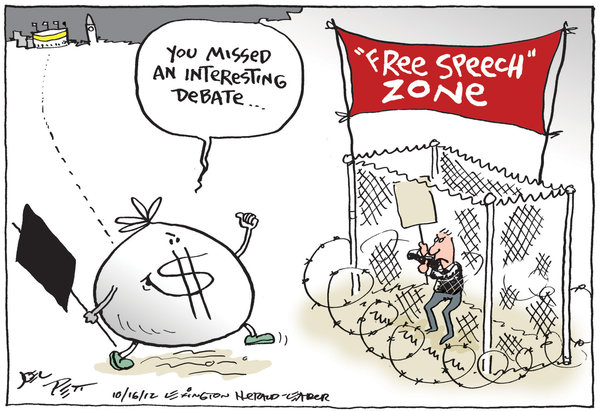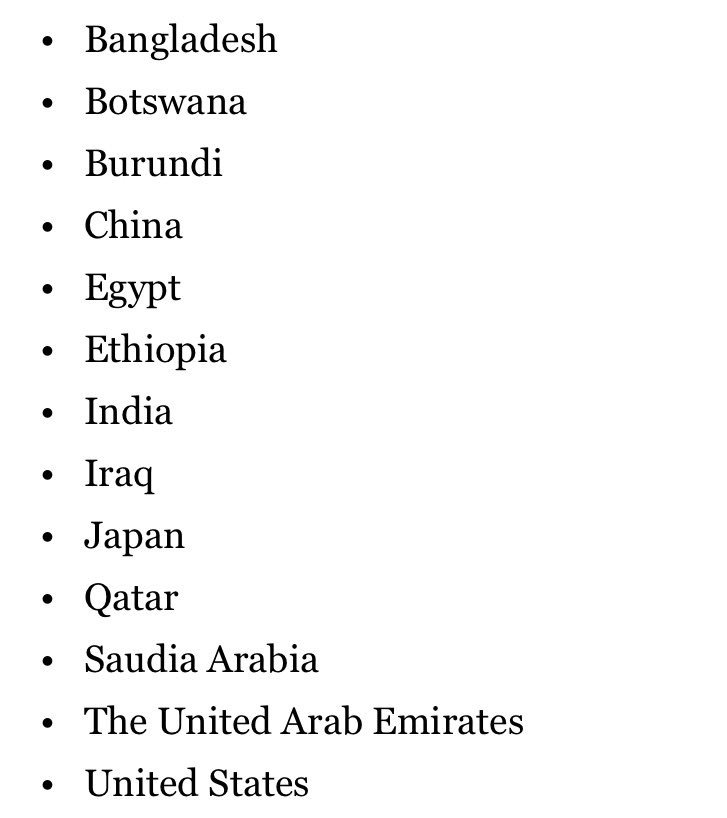(Fair warning: one of those loooong posts.)
Nobody can choose to live without limits. Anybody who tries just ends up crashing into them. Eating without limits will make you too sick to eat at all. Gas guzzling without limits will end in no gas — or enough global warming to make the whole thing moot. (That’s not an exclusive “or.”) Too much information causes overload, not wisdom. There are always limits.

Too much information
(Illustration: John Tenniel)
The only real choice is whether to recognize the constraints instead of crashing into them and whether to find optimal ways of working within them instead of suffering through constant crises.
In that spirit, I want to discuss the First Amendment, the right to free expression. It has limits — such as not falsely yelling “Fire!” in crowded theaters and requiring tiny dollops of truth in advertising — but somehow only the old limits are okay. Updating the limits to deal with updated technology is out of bounds. It’s as if, when it comes to free speech, the most liberal among us all subscribe to a doctrine of Original Intent.
That blinkered view has worked well enough in the past because past problems were small enough to be kept at bay with small fences. Broadcasting at one time was limited by lung power, and only the immediate circle of a loudmouth had to put up with their constant blather. The change began with the printing press, sped up with radio, ran away with television, and is now screaming up the exponential part of the curve with the internet. There are more and more loudmouths to shut out. Ads. Insults. Bullying. Harassment. Grossness. Drivel. Lies. Politicians. The problem is getting so bad that more and more voices are being raised saying it’s time to do something. Most people aren’t sure what.
I’m not sure either, but what I am sure of is that we absolutely must get out in front of this. The only people who are sure of the solution are places like Saudi Arabia, and nobody (except the Saudi Arabian government) wants them deciding on the limits of speech.
The sorry piece of work known as “The Innocence of Muslims,” better titled “The Nastiness of Christians,” has led to a recent spate of shouts for censorship. One example:
In Saudi Arabia, the government demanded that Google block its citizens’ access to the video. Google complied on Sept. 19; it had already done the same for Libya, Egypt, India and Indonesia. …
This Internet censorship is [in] line with the kingdom’s muzzling of its national media. Overall restrictions have worsened since the Arab Spring popular revolutions of 2011. …
“Bearing in mind that countries cannot apply their own laws to acts in another country, there is a crying need for international collaboration to address ‘freedom of expression,’ which clearly disregards public order[.]”
Saudi Arabia is not an outlier in this case. Pakistan would like the UN and the Organization for Islamic Cooperation to start enforcing international anti-blasphemy laws. The Prime Minister of Egypt said that we all should “take the necessary measures to ensure that insulting … belief in their Prophet, that should not happen, and if it happens people should pay for what they do.” Singapore’s Deputy Prime Minister says the anti-Islam film must be blocked and that is not censorship, but says nothing about why it differs.
It’s easy to feel sympathetic when the trigger is something as revolting as the Nastiness of Christians.
Then I read that the Turks are putting an internationally renowned pianist, Fazil Say, on trial for insulting Islam on Twitter. The “insult” was poking fun at a cleric for being in a hurry: “Say tweeted: ‘Why such haste? Have you got a mistress waiting or a raki on the table?’ Raki is a traditional alcoholic drink made with aniseed.”
The real problem isn’t even the possible 18 months in jail. It’s the hassle, expense, time, and stress of dealing with the legal battle. Even if he and everyone like him were always ultimately cleared of any wrongdoing, the possibility of legal harassment would stop most people from saying anything, just in case.
The West is not immune to calls for some kind of action. In Britain, a new Public Order Act (it’s interesting how these things always seem to be justified by “order”) — has made “insults” illegal.
Section 5 of the Act … outlaws threatening, abusive and insulting words or behaviour….
What constitutes “insulting” is not clear. It has resulted in a string of controversial arrests.
They include a 16-year-old boy being held for peacefully holding a placard reading “Scientology is a dangerous cult”….
These and similar flailings toward a solution prompted Jonathan Turley to write,
The very right that laid the foundation for Western civilization is increasingly viewed as a nuisance, if not a threat. Whether speech is deemed i[n]flammatory or hateful or discriminatory or simply false, society is denying speech rights in the name of tolerance, enforcing mutual respect through categorical censorship.
As in a troubled marriage, the West seems to be falling out of love with free speech. Unable to divorce ourselves from this defining right, we take refuge instead in an awkward and forced silence.
Turley doesn’t actually say so in that piece, but I get the impression also from his other writing that he feels there is no way to stop the bad without also destroying the good. In general, the majority response to calls for limiting free speech is that any limits, beyond the old ones we’re used to, will put us on a slippery slope to losing the vital right entirely.
I don’t see that. If the old limits on free expression enhance the right for everyone, and they do, then new limits applied in the same spirit won’t end in censorship either.
The vital point about the old limits that work is they are based on balancing other rights with the First Amendment. There’s no right to cheat people out of money. Stealing by using words is still stealing, which is clear to everyone on an individual basis when con artists try it. It’s no less true when it’s broadcast as advertising, and hence we have (minimal) truth-in-advertising laws. Those aren’t based on censorship. They’re not favoring a message. They’re recognizing that the expression involved is not being used to communicate, but as a tool of burglary.
The same goes for false shouts of “Fire!” in crowded theaters. The intention of the speech in question is not communication but a specific, and potentially dangerous, effect. People are terrified for nothing except somebody’s sick idea of a joke, and could even get trampled and hurt because of it. Again, it’s not censorship because what is being suppressed is not one message as opposed to another, but the use of any words purely as a tool to harm people.
Those examples point up the difference between a rights-based approach and censorship. Censorship favors some messages by suppressing others, whereas rights must be equally applicable to everyone. Any inequality favoring some over others is a privilege, not a right. In a rule-based system, everyone can apply the rule and the results are the same no matter who does it. It is a government of laws, not of “men,” to use the old phrase.
Censorship cannot be applied by everyone equally, and that’s why it cannot be a valid tool to serve free speech. As it’s commonly understood, it refers to some authority, usually governmental, deciding what can be said and what cannot. It is asymmetrical by its very nature. Only a few people can decide what’s acceptable, If everybody did it, the whole system would break down instantly.
I suspect it’s that sense of asymmetry that makes so many thoughtful people adamantly opposed to any new rules regarding free speech. Turley, for instance, in the piece quoted above, mentions the pitfalls of the government deciding what people can and cannot say. I would add that it’s not much better when any other institution does it. A rule-based system that applies to everyone equally can’t allow any subset of people to make those decisions, whether it’s the movie industry, the recording industry, the search engine industry, or even the association of university professors.
We have several types of censorship already operating now. The music and movie industries enforce warrantless takedown notices against content they don’t like. Search engines refuse to be transparent about criteria and thus effectively censor lowranked results. Companies control app stores with a significant user base and decide without transparency or right of appeal what those users can see. There’s not much worry about these new forms of censorship because it’s not The Government doing them and because profit is assumed to take precedence over free speech. (Nobody agrees with that last when it’s stated plainly, but it is how people behave. “It’s their app store. You don’t like it, go somewhere else.”) Even though we’re not worrying about private censorship, it’s still censorship.
The practical implications of real free speech rights mean that the likes of Google must be globally regulated to make their rules for selection of information known to all. They mean that copyright law can’t be used in the service of industry business models. They mean that trade treaties, which should have no impact on basic rights, cannot have an impact on basic rights. Right now, for instance, the Trans-Pacific Partnership is being negotiated in secret. On the basis of leaks, “The ACLU claims that the copyright provisions in the TPP are ‘the biggest threat to free speech you’ve never heard of.'”
While we’re worrying about government censorship, other forms of suppression are compromising our rights as we speak. That’s another reason why new rules to limit and protect freedom of speech are essential. What is and is not acceptable in the public square has to be explicit and must apply equally. An open legal system accessible to all is another foundational principle of Western civilization, together with freedom of expression. By ignoring that, and by refusing to even think about new explicit limits made necessary by modern technology, even censorship is starting to look good. Refusal to contemplate constraints, for fear of losing the right to free expression, is itself destroying the right. That is foolish.
The first step in dealing with any problem is to acknowledge that it exists. And it does. Cyberbullying has poisoned countless children’s lives. Certainly, non-electronic bullying has, too, but that doesn’t make the electronic version less damaging. Creepshots are just one of many internet phenomena that make living while female a punishable offence. Tracking has become so pervasive and entrenched it’s becoming hard to imagine any response other than pretending it doesn’t matter. Levels of disrespect for the dead that would be unacceptable on a battlefield, let alone outside it, are being justified in the name of free speech. One of the laws of war, at least as old as the Old Testament, is that opposing sides must let each other bury their dead in peace. The list could go on and on and on. Many people see a problem. It’s not limited to tetchy Muslims.
That millions, even billions, of people feel abused by free speech suggests there is some deficiency in our interpretation of it. It’s especially likely given that the unhappy people are as different as atheist feminists and religious fundamentalists. It’s also possible they’re all wrong, but the size and diversity of the group who feels harm means it makes sense to examine the merits before deciding that the current status quo is the only possible one.
The symptoms of unhappiness all trace back to the same larger problem: that time and space are no longer enough to filter out the loudmouths among us. Technology, by taking away some limits, as it has also for instance by enabling birth control or environmental impacts, makes us bump up against limits in our own understanding and behavior.
However, although there’s a common element to the causes, the resulting harm can be very different. Annoyance at a spammer is not the same as the violation caused by creepshots or the real world consequences of voters fooled about climate disruption or the totalitarian potential of minute knowledge about every detail of everyone’s life. Expression may be the problem, but the answer may or may not be silence. I’ll try to lay out some of the separate strands.
Freedom of speech has so far been asymmetrical. Freedom of motion, for instance, doesn’t give you the right to walk into someone. But freedom of speech is missing its matching right, the right not to hear.
The inability to refuse to hear is at the root of many emerging problems: telemarketers who used to call during dinner (in the days when people still sat down to eat dinner), spammers, demands to censor sex “for the sake of the children,” and demands to censor all religiously objectionable expressions everywhere. That last, in particular, makes me think of the story about the king who wanted his land paved in leather because it was nicer on the feet, until a sage pointed out he could wear shoes instead. A right not to hear implies ads should not be seen or heard unless you request them. Imagine that world for a moment. No wonder nobody even mentions the right to silence.
Then there is the increasing problem of offensive messages. They’re not a problem for the originator, who doesn’t find them offensive, but for the subject, who does. The offended people may not even be the target audience — usually they aren’t — but that doesn’t lessen the offense for them. Here again, the missing right is being able to avoid those messages. Mass media have started to take baby steps toward giving people some control by flagging particularly gory news images before the reader sees them. But we need vastly expanded abilities to control how much and how badly the rest of the world can step on our toes. Judicious tagging that coordinates with filters could go a long way toward removing sexism, violence for entertainment, impiety, religiosity, or whatever other criteria the user wants. Yes, that would require the creators to help people avoid their content. If there was the same level of respect for the right not to hear as there is for free speech, there’s no reason why people of good will would not cooperate. And, as with free speech, there are remedies in law for those who violate rights. Note the important point that the user decides what to filter. Since it’s the user who has the problem, the user should control the solution.
I realize this whole zone of offensiveness is rife with contradictions, over-reach, and over-reaction. I realize I’m suggesting something like parental controls on steroids with the one enormous difference that it is under the control of the user. The difficulties of limiting offensiveness don’t change the fact that we need some replacement for the old rules of politeness which kept people from being rude to each other’s faces. Those rules were there to reduce the murder rate. They are necessary. I don’t know the best ways of implementing a right not to hear. What I’m saying is that we need to explicitly acknowledge the existence of that right, and that it is not enough to give up simply because the solution isn’t obvious.
To the extent that effective countermeasures against offensiveness have already been taken, they’re generally the wrong ones. The rules against offense in private life emphatically do not extend to politics. Expressing political opinions on political occasions is just about the whole point of free speech. Yet the only real limit on “offensiveness” seen recently has been on the expression of political opinions that inconvenience the powers-that-be during political events.
Security at George Bush’s events in the mid-2000s became notorious for removing any visible dissent. Even wearing the wrong t-shirt was enough to be expelled. Political t-shirts might be inappropriate at a summer picnic, but they cannot be inappropriate at a political speech. It’s also become customary to contain protests at political events in very small free speech zones. The justification, as always, is order.

The limits to limiting free speech
(Illustration: Joel Pett)
In a praiseworthy attempt to avoid the travesty of little “free speech” pens, the Supreme Court recently fell into the other error: removing all limits from offensiveness. The case involved anti-gay fanatics who disrupt funerals to insult the dead person being honored. The Supremes held that the fanatics had a right to express their opinion, which they do, and that they therefore had a right to express it anywhere. They don’t, not at funerals. (I know that officially the justification is that they had a right to use the public sidewalk for their demonstration, but that’s nonsense. If it was about the sidewalk, they could use any other sidewalk they wanted. They wanted to use the one that interfered with the funeral.)
It is not essential to the preservation of free speech rights that people be allowed to express absolutely all opinions absolutely anywhere in any way they please. Congress wouldn’t tolerate a rock concert on the floor of the House during a debate. There are other places to hold rock concerts. A kindergarten class doesn’t need to take place in church during Sunday service. Demanding silence for a tea ceremony would be stupid in the stadium during a football game.
It actually seems rather easy to come up with a rule of thumb that both preserves free speech and appropriate behavior. Limits on expressing opinions should be the rarity, not the rule, and should require valid justification. When there is justification, small spaces can be preserved as islands of controlled speech. Outside of them, control violates free speech rights. Free speech pens are unacceptable because they invert the proper size relationships and, when in a political context, because they also limit political statements at political events. Nonviolent political speech at political events can never be inappropriate. It might be disruptive, but disruptive is not the same as inappropriate in politics.
Offensive speech shades into hate speech. There is no absolute line between the two, but there is a difference. Offensiveness is a by-product of some other goal. The content is not produced in order to offend. When it is, then it becomes hate speech. The difference lies in the intent of the speaker, and when there’s an intention to be hurtful, then it’s run over the line into hate speech.
The recent revoltingness with the Innocence of Muslims / Nastiness of Christians is a good case in point. It is unquestionably offensive. What makes it hate speech is the fact that when it did not generate enough attention, they paid for a translation into Arabic. They wanted to be sure that as many Muslims were insulted by it as possible. That is hate speech.
It may be necessary to point out that the motive for wanting to hurt people doesn’t matter. It’s the harm that matters. Profit, for instance, is not a better excuse than hatred. Producing, posting, or linking to hateful garbage because it brings in clicks and revenue is still hate speech.
Hate speech is not about ideas, not even primitive ones. It’s about using expression to do harm. That is the vital point to remember because it clarifies why hate speech has no business finding protection under the First Amendment. It’s intention is harm, not communication. It is using speech as a weapon and the words or images are just ammunition. That’s a fundamentally different category than anything covered by free speech protections. The First Amendment protects expressions, not weapons. Just because hate speech uses expression to cause harm doesn’t change that. It only camouflages it.
That’s just as true for private hate speech as public because one’s right not to be harmed by others doesn’t depend on quantity. Robbery doesn’t have to be a group activity to be illegal. Cyberbullying, for instance, is a subset of hate speech that can be private. It’s the use of speech as a tool of harm.
It’s probably also worth pointing out that private speech generally, when it’s not hate speech, should be as unregulated as it is now. Nobody wants a world where you can’t yell at your own TV. There again, though, the essential difference is that nobody is trying to harm another person when shouting at TVs, whereas in hate speech, they are.
As with any other activity whose purpose is to harm others, society’s response has to be to prevent it, or failing that to shut it down and to punish it. Hate speech is one case where silencing is not only justified, it is the only valid response.
Does that mean I’m advocating censorship? I say no because I think it is useful to distinguish between favoring some communications over others (censorship) and stopping harm to fellow citizens. Those two are not the same, and that should be recognized by using different terms. Maybe we could call it hate speech disarmament.
If the suppression of hate speech is to differ from censorship, then it must be based on rules equally applicable to everyone. Its distinguishing feature is an insistence on humiliating and otherwise harming its targets. Detecting intention always requires judgment calls, but that’s not something new for the legal system. The complexity of determining hateful intent is not that different from estimating intent generally. It’s difficult, but not always impossible. In gray areas, the accused gets the benefit of the doubt, as usual, but when it is possible to make a determination, then the hate speech involved should be shut down.
Another rule that could be applied without discrimination is a prohibition against all suggestions of violence. Criticism of governments, businesses, individuals, ethnic groups, religions, of anything at all, never requires advocating physical harm to people. I realize that if that rule was applied strictly, it would silence a majority of comments on the web. For me, the price of having to find new insults is worth the benefit of more easily distinguishing hate speech. If we’re serious about silencing hate speech then any speech which is indistinguishable from it except in the stated intent of the speaker has to be silenced, too. Claiming it’s just an expression or a joke or a mistake isn’t good enough because the same claim is made by anyone caught being hateful.
The distinctions between hate and harmless but offensive speech isn’t easy, but it’s something that needs attention before all the people infuriated by hatred sabotage free speech itself. To say that people (usually other people) should suffer hate speech because it’s too difficult to come up with a solution is an excuse, not an answer.
Privacy is yet another area where actions justified under First Amendment rights sometimes trespass. First, let me define terms. I think there’s a fundamental misunderstanding about the concept of privacy. It’s assumed to be about specific types of information, and which are acceptable to publicize. There are some quite exhaustive studies discussing where to draw the line. Whether insurance companies can share certain types of medical information with employers, whether it’s acceptable for robots to read emails and use that information, who can publish your address and where, whether publishing people’s faces or car license plates on Google Streetview is okay, and so on. They miss the point.
Privacy is about control of one’s own information. If you and I are both on Facebook and you want your contacts to know you’re now the proud owner of an iphone, then you won’t feel a loss of privacy when Facebook’s Beacon publishes that fact. I, on the other hand, might live in the sort of neighborhood where I don’t want word leaking out that I have eminently resaleable electronics. Same data, different priorities, and different reasons for those priorities. So long as what we each care about stays private, neither you nor I feel there’s any harm done. It’s the control that matters.
If privacy is about control rather than specific information, then the right response to violations of it is to give that control back to the person from whom it was taken. The balance is not between free speech and censorship. It’s between free speech and privacy.
(I realize there are technical issues with getting rid of data once published, but I’m just trying to discuss the rights involved. Once those are clear, then we could go about figuring out which technical issues need enforcement and how to go about it.)
Tracking for marketing purposes is one near-universal invasion of privacy. It’s taking information about you and using it without your permission. If tracking respected the right to privacy, it would have to be opt-in and never opt-out, always and everywhere. Furthermore, when there’s a right to control your own information, the permission would be revocable at any time. As with opt-in advertising, just imagine that world for a moment.
There’s a tangent about privacy that perhaps needs to be explicit. Privacy rights may not be in the Magna Carta or the US Constitution, but that’s only because, once again, technology has removed limits that protected us from our own bad behavior. As I’ve said elsewhere:
[C]ontrol over one’s own information is necessary if other rights are to have any meaning. The only reason that hasn’t always been obvious is that we haven’t had the technical capability to spy on each other 24/7, or to retain every whisper forever. When anyone on the internet — including, for instance, your boss — can look over your shoulder and examine where you live, which plants grow in your window boxes, which gym you visit, who you have sex with, and how you looked in your baby pictures, there will effectively be no freedom left. Everything will have to be hidden if everyone can see it. What you can say will depend on what others approve of being said. Where you can go will depend on where others approve of you going. Old-fashioned police states, which depended on limited little human informants to keep people in line, will come to seem like desirable places with a few minor constraints. The logical conclusion of no privacy rights is no [meaningful] freedom of speech, movement, or assembly.
“Free speech” violations of privacy can be much worse than supposedly trivial tracking. The internet phenomenon of creepshots is another invasion of privacy, among many examples of pornographic violation on the web. Few things could be more private than sexual photos of oneself, and they fall unequivocally under a right to privacy. There’s nothing wrong with sexual photos when they’re under the control of the individual involved. They’re very wrong otherwise. Sexual humiliation using free speech as an excuse is not merely rude, unfortunate, gross, obscene, or annoying. It’s a violation of the fundamental right to privacy. Violations of rights are crimes, not minor annoyances.
+ + +
I started with the goal of examining free speech rights given modern technology and have ended with a world we don’t live in. One where we have real privacy rights, even when it bothers Google’s bottom line. One where content providers have to make it easy for people to avoid their content. One where hate speech is not a joke. It’s hard to feel such a state could be more than a (fever) dream precisely because it is so alien.
The rights being ignored for the sake of free speech vary from the clearly recognized one of not suffering physical threats to the more recently recognized right to privacy and to the still-unrecognized right to silence. Solutions have to vary, too, if they’re to deal with the actual cause. It’s not a simple matter of being for free speech and against censorship.
A rights-based system has a characteristic that may be worth mentioning as an aid to differentiating it from not-as-good substitutes. Equality implies that maximum control compatible with equal treatment of others must always be vested in the individual. Individuals decide what to say, what not to hear, what to keep private, what to broadcast. Equality also cannot coexist with censorship, even in good causes such as public order or profit.
The government does have a role in free speech. It’s the same one it has now. Rules, including those formal ones called laws, need enforcement, which is a function of government. But state powers do not decide what the rules are. When the goal is rights rather than privileges, what’s acceptable is what works when everyone does it. What’s not acceptable is what doesn’t work when everyone does it. The rules, not any person or group of people, define some behaviors as allowable and others as not.
The hard part is fine-tuning those rules so they get better and better at hitting the target — preventing free speech from encroaching on other rights — without opening the door to prosecuting pianists and peaceful demonstrators.
Difficult as the hard part is, and it is ferociously difficult, we can’t go on pretending that the problems of free speech can be solved with more free speech. We’re going to have to do something about the way it damages other rights or we’ll lose free expression itself. No democracy could survive that loss. It’s not an optional quest.
Update: Every time I think I have the last paragraph written, yet another news item comes along as an example of what I’m trying to say: 19 year-old jailed for overstepping the bounds of good taste.
Everyone agrees that his “jokes” making fun of two kidnapped girls crossed the line. Matthew Woods swiftly became an object of contempt after he posted the crude and offensive comments on his Facebook page.
But did he deserve to be locked up for them?
A judge thought so, and ordered the 19-year-old to spend 12 weeks in jail, essentially for overstepping the bounds of good taste.
With a right not to hear and adequate filters, the doofus could be crude without going to jail and the rest of us wouldn’t have to pollute our minds with his garbage. We really need that right recognized.
Angry responses streamed in almost immediately after he pressed the “send” button. Public vitriol escalated to the point that a mob of about 50 people reportedly gathered outside Woods’ house, causing police to take him into custody for his own safety.
As I said, the old rules against offensiveness were there to reduce the murder rate.
 Print This Post
Print This Post
 Print This Post
Print This Post











